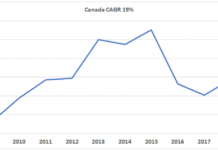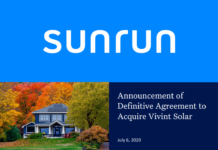Equus Total Return (NYSE: EQS) is a closed-end fund that trades at a 42% discount to its net asset value (NAV). The fund invests primarily in both debt and equity instruments of small-caps and private companies. Each quarter, management must report the fair value of its net assets, but the stock market value of Equus is much lower than that of its net assets. Here’s a chart showing Equus’ discount to its net assets for the last five years: 
As we can see, Equus is used to trading at a discount to its NAV, but recent negativity across the US market has taken it to even newer lows relative to what it owns. One of Equus’ key holdings (in fact, it makes up almost one third of its portfolio) is an equity position in Infinia Corporation. Infinia is a company aspiring to mass produce a low-cost solar power converter. The fair value of one of Equus’ investments in Infinia (based on follow-up venture capital investments) recently jumped from $3 million to over $20 million, as the company demonstrated a prototype late last year that converts solar energy into electricity at twice the efficiency and at a lower cost than existing products. One way to look at a purchase of Equus’ stock at this discount level is that for the price of one share at $6.90, you’re getting all of its other assets (which are worth about $8.30/sh) for a slight discount, and on top of that you’re getting the investment in Infinia (valued at $3.50/sh) for free! Of course, before jumping in blindly you’ll want to make sure you read Equus’ latest reports along with its financial statements and their notes, as we’ve discussed here. In reading these reports, I found that Equus does carry some debt on its balance sheet, which is somewhat rare for a fund. This has the effect of amplifying any changes in the values of their investments, both to the upside and the downside (the effect of leverage). Furthermore, most of the investments are in companies that aren’t public, and therefore Equus is not as liquid as those funds that invest only in the stock market (undoubtedly, this liquidity premium contributes to the larger than average historical discount we see in the chart above). The lack of market quotations also makes it more difficult for management to value each of it’s holdings. Infinia is one such example, as it doesn’t trade on the stock market and so it’s not available for an individual investor to buy. Although the drawback is that Equus’ investments are illiquid, it provides an investor the opportunity to get into a company like Infinia when it would otherwise be limited to venture capital firms. The discount is a bonus that makes this an intriguing play from a value investing point of view.
Saj Karsan is a guest contributor on AltEnergyStocks.com. Saj is a value investor at Barel-Karsan, and can be regularly found writing for Barel-Karsan’s blog.
DISCLOSURE: The author does not have a position in EQS
DISCLAIMER: The author is not a registered investment advisor. The information and trades provided here are for informational purposes only and are not a solicitation to buy or sell any of these securities. Investing involves substantial risk and you should evaluate your own risk levels before you make any investment. Past results are not an indication of future performance. Please take the time to read the full disclaimer here.









I have one question about EQS. If I was to buy this stock, I’d buy it to hold Infinia long. But if the asset gets sold prematurely, I’m left with a bunch of junk companies. Do we know anything about the turnover of this fund, and its commitment to our sector of interest? If I found a VC type company that focused on alt energy, I’d be really pleased. Just wondering if this one in particular is a useful play in this field.
The nature of the fund forces it’s turnover to be lower than most, as the companies in which it invests (including Infinia) are not traded in the markets. Also, Equus has now made two investments in Infinia, so they are significant shareholders. Having said that though, it’s still possible for them to unload their position if they make a deal with another VC firm, so their investment in Infinia is not set in stone, but you will find out about it in their quarterly holdings report, and thus you can choose to sell at that time.
Well, also according to ETF connect, this stock has a management fee of over 5% a year! So at least the fund managers are going to make money on my money. This is too high, but I agree that the discount makes it attractive as a short term play.
Hi Brian,
You’re right the fee is high relative to most closed-end funds. But some of that is related to the type of fund it is. They need a wide range of expertise to be able to invest knowledgeably in their long list of private enterprises, and these enterprises don’t have the same disclosure requirements as public companies, so they require some extra costs on that end. Big sticker shock, though, you’re right.